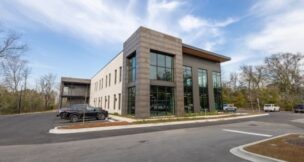Parenting frustration is father of invention
Staff //January 2, 2019//
Dads launch company to revolutionize baby bottle industry; U.S. base is in Charleston
An Israeli company trying to revolutionize the baby bottle industry all started in 2012 with Ayal Lanternari anxiously warming his wife’s refrigerated breastmilk as his 3-month-old son cried.
He said the process — heating the milk with warm water — felt much too long as his baby’s cries became stronger. The milk was ready after 10 minutes, and a relieved Lanternari was able to feed his son a bottle.
 As his son ate, Lanternari thought of how challenging the feeding process could be, with the need to reheat quickly, safely and evenly. He felt that the bottles currently on the market fell short of what parents needed — the ability to warm breastmilk without overheating it, which can damage its nutrients.
As his son ate, Lanternari thought of how challenging the feeding process could be, with the need to reheat quickly, safely and evenly. He felt that the bottles currently on the market fell short of what parents needed — the ability to warm breastmilk without overheating it, which can damage its nutrients.
Using warm water takes time, and reheating in a microwave or on the stovetop can damage the milk or create hot spots that could burn the baby’s mouth, according to recommendations from the World Health Organization and the American Academy of Pediatrics.
Lanternari wanted to reinvent and redesign the traditional baby bottle to solve this pain point for parents. He envisioned a bottle that spread the milk out into a thinner layer, enabling quick and even heating.
The idea for Nanobebe, now a global manufacturer of baby bottles and products, was born that night in his home in Tel Aviv, Israel.
“When you have the opportunity to do something with meaning, you go for it,” Lanternari said.
Building a brand
The morning after his bottle epiphany, Lanternari called his childhood best friend, Asaf Kehat, to share his idea. The two immediately started brainstorming. Lanternari and Kehat, both biomedical engineers at the time, worked on their project at night after their day jobs.
“We saw a gap in the market. We saw an opportunity,” Lanternari said. “We started the company together.”
Over the next several years, the Nanobebe co-founders created scores of design prototypes, conducted market research and held focus groups. They talked to pediatricians and parents about what was needed in a bottle.
The resulting Nanobebe bottle has a wider shape compared to vertical bottles. This enables a quick, even reheat of the milk and keeps nutrients intact, Lanternari said.
“This is the first bottle designed to think about the product inside of it,” Lanternari said. “This is a game-changer.”
The bottle’s shape also mimics a woman’s breast to help babies better adjust to drinking from a bottle. Ellie Barziv, Nanobebe’s marketing director, said this is important for fathers to be able to feed their children or for mothers to return to work, for example.
“The transition is easier,” Barziv said. “The shape of the bottle resembles mom. Bottle rejection is less of an issue.”
Lanternari said the company aims to create products that protect the nutrients in breastmilk, help babies be breastfed longer and ease some of the struggles of feeding for parents. Similar to some other bottles, the same bottle can be used for pumping, storing, warming and feeding.
The company has expanded beyond baby bottles to produce pacifiers and breastmilk kits with storage bags, warming bowls, drying racks and steam sterilizers.
 “Now it is a full line, an experience based around the idea that nutrients matter and parents need support during this time,” Barziv said.
“Now it is a full line, an experience based around the idea that nutrients matter and parents need support during this time,” Barziv said.
The company began selling products earlier this year. Nanobebe products are now sold by 2,000 stores, including major retailers Amazon, Target and Buy Buy Baby; Walmart will begin selling Nanobebe in 2019.
Lanternari moved to Charleston this fall to establish the company’s U.S. headquarters and operations. The co-founders now run the company from Charleston and Tel Aviv.
“There are many good ideas, but there are not many good teams,” Lanternari said. “The key is to have the right team and the right culture.”
The Charleston factor
The idea of Nanobebe establishing a U.S. presence in Charleston stemmed from the South Carolina-Israel Collaboration, an effort to strengthen business ties between S.C. and Israeli companies by organizing trips for business executives.
The idea is to forge relationships that could lead to joint research efforts or new operations in either locale.
The collaboration has led six such trips to Israel since 2011, resulting in several Israeli companies launching operations in South Carolina, including Neuroquest, Scopus Security Solutions and Nanobebe.
The Nanobebe co-founders met Jonathan Zucker, president of North Charleston-based The InterTech Group, and Anita Zucker, CEO of The InterTech Group and Jonathan’s mother, during a startup “speed dating” event during one such trip several years ago. Those conversations sparked an interest in the region.
“The primary goal of these delegations has certainly been economic development, but the approach to achieving success is built on building awareness of all South Carolina has to offer for Israeli companies entering the U.S. market, for Israeli researchers seeking world-class research partnerships, and on cultivating strong relationships to stand the test of time,” Jonathan Zucker said in an email.
He added that the trips also show S.C. businesspeople opportunities in Israel.
“As we continue to build and strengthen our own innovation engines here in South Carolina, we can serve to learn a great deal about the culture of innovation that courses through the veins of Israel’s startup ecosystem, incubators and accelerators, and the unique enabling actions that the government has taken to stimulate this important economic engine,” Zucker said.
Lanternari said Charleston’s port, strong life sciences sector and city charm convinced him to launch operations in the U.S.; he sees the Charleston lifestyle as an easy selling point when recruiting employees.
Nanobebe currently employs several people in an office space along U.S. Highway 17 in West Ashley, with plans to hire more people over the next few years. The firm also uses warehouse space in North Charleston and ships in and out of the Port of Charleston.
The S.C. Department of Commerce and the Charleston Regional Development Alliance’s Landing Pad program also helped Nanobebe enter the U.S. market.
The roughly 30-person company maintains manufacturing and research and development at its global headquarters in Tel Aviv, as well as manufacturing operations in China.
Nanobebe launched with private investments and has expanded with funding from The InterTech Group, as well as other investment funds. The company declined to disclose details. Zucker said his company’s investment was a “sizable seed investment.”
“We truly believe that the company has identified an important opportunity in the infant-feeding category that can result in a meaningful improvement in the nutrition delivered to infants, while at the same time improving the experience for frustrated young parents trying to get their babies fed,” Zucker said.
This story originally appeared in the Dec. 10, 2018, print edition of the Charleston Regional Business Journal.
















